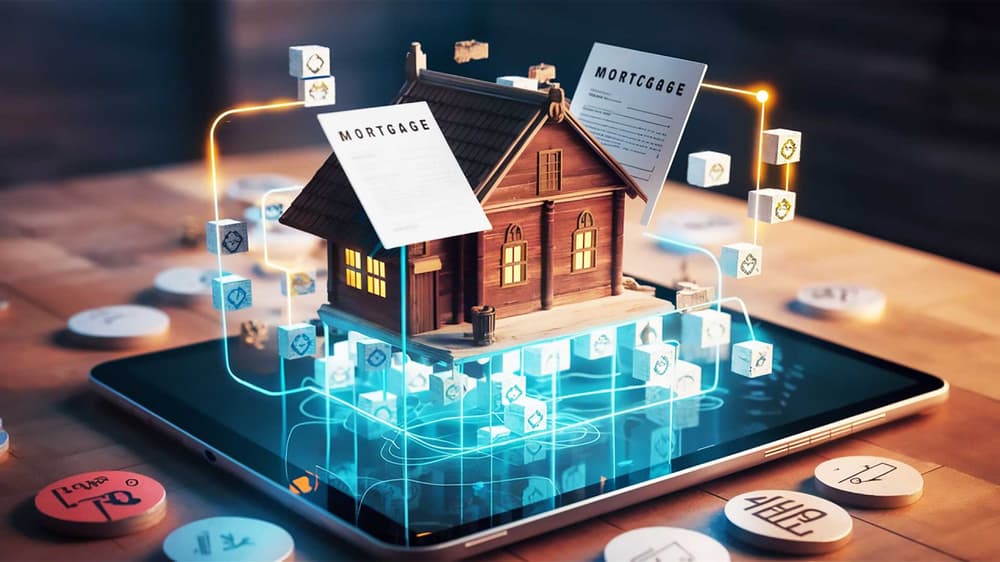Tokenized mortgage solutions leverage blockchain technology to revolutionize real estate transactions by allowing fractional ownership of properties through digital tokens. This innovation simplifies the mortgage process, making it faster, more secure, and more transparent by utilizing smart contracts
Tokenized Mortgage Solutions for Real Estate Transactions: Revolutionizing the Housing Market with Blockchain
Written by Sumit Kaushik

The real estate market, which was previously characterized by slow-moving processes and huge barriers to entry, is being revolutionized on an industrial scale by tokenization.
With the help of blockchain technology, tokenized mortgage securities are enabling property investors to purchase and sell fractions of property in real-time, facilitating transactions, and introducing a whole new level of liquidity into an otherwise illiquid market.
What is Tokenization in Real Estate?
Tokenization is a way of swapping ownership of a physical asset—property, for example—into a digital token to own a percentage of the asset. Tokens are issued on a blockchain platform to provide transparency, security, and efficiency.
Tokenization of real property enables investors to invest in a portion of property without having to invest in the whole asset. That makes it less expensive for more people to be able to take part in the real property investment opportunity as there are lesser entry requirements for the investor. It offers diversification, and therefore a bit of it is an affordable proposal to more.
Traditional mortgage purchasing is slow and cumbersome, taking weeks or months of credit checks, paperwork, and approvals. Tokenized mortgages simplify all of this by tokenizing the mortgage agreement and utilizing smart contracts.
- Asset Tokenization: Physical property assets are divided into digital tokens on a blockchain, and each token is an asset that represents ownership of a portion of the asset's value.
- Smart Contracts: Smart contracts are employed to automatically enforce the terms of the mortgage, including the payment plan, interest rate, and percentage of ownership.
- Fractional Ownership: Rather than investing in an entire property, investors can invest fractions (tokens) of the property, reducing the minimum investment and making real estate accessible to more individuals.
- Mortgage Payments on Blockchain: Automatic payments are paid on the blockchain, minimizing the potential for human mistakes and enhancing transparency.
Tokenized Mortgage Benefits
Increased Liquidity
Real estate is generally an illiquid one since it might take a long while to sell out a property. Tokenization shatters this since it makes it possible for one to possess fractional ownership, and selling and buying ownership shares is simple and can be done in real time. Investors can instantly sell their ownership stakes in properties and without waiting for a complete sale of the property.
Lower Entry Barriers
Tokenized property makes the market accessible to a wider pool of investors, including those who lack enough funds to buy one entire property. Through investing in fractional ownership, even retail investors can access such valuable assets as commercial real estate or luxury apartments.
Transparency & Security
Blockchain technology is more transparent since transactions are stored in a public ledger. This implies that the seller and buyer are confident that their transaction is correct and secure, free from fraud and disputes.
Quicker Transactions
House purchases and traditional mortgage approvals can take weeks. Tokenized mortgages use smart contracts to enable and automate the whole process, payment and approval. Not only do they cut down on time but also middleman transaction costs.
Global Reach
Tokenized mortgages provide global investing opportunities as anybody with an internet connection can become involved. Everybody on the planet can now effortlessly invest in real estate where he would have been faced with severe hurdles under geographic or regulatory challenges otherwise.
Main Applications of Tokenized Mortgages
- Real Estate Investment Platforms: Blockchain platforms are providing fractional ownership of properties so that individuals can diversify their portfolio by gaining access to high-end properties at affordable costs.
- Crowdfunding Real Estate Developments: Developers can raise funds for real estate developments by tokenizing future earnings or equity in a project and offering those tokens to small investors.
- Automated Property Management: Property management will be automated through smart contracts, including rental payments and property maintenance charges, all of which are logged and activated on the blockchain.
Tokenized Mortgages for the Future
Tokenized mortgages could upset the entire real estate market. With each advancing development in technology, there will be regulations that enable and insure tokenized transactions. More and more real estate tokenization platforms will continue to develop, and retail investors will have access to global markets of real estate.
Additionally, as institutional investors, financial institutions, and developers increasingly develop awareness of the potential of tokenization, we will see wider adoption that leads to a more transparent, efficient, and inclusive real estate market.
Conclusion
Blockchain tokenized mortgage platforms are spearheading a more liquid, transparent, and accessible property market. Property ownership democratization and ease of processing the mortgage, this is changing property investment to making it as enticing for small investors as institutions.
With the synthesis of blockchain technology and property tokenization, homeownership and real estate investment are an even brighter and more inclusive future than ever.